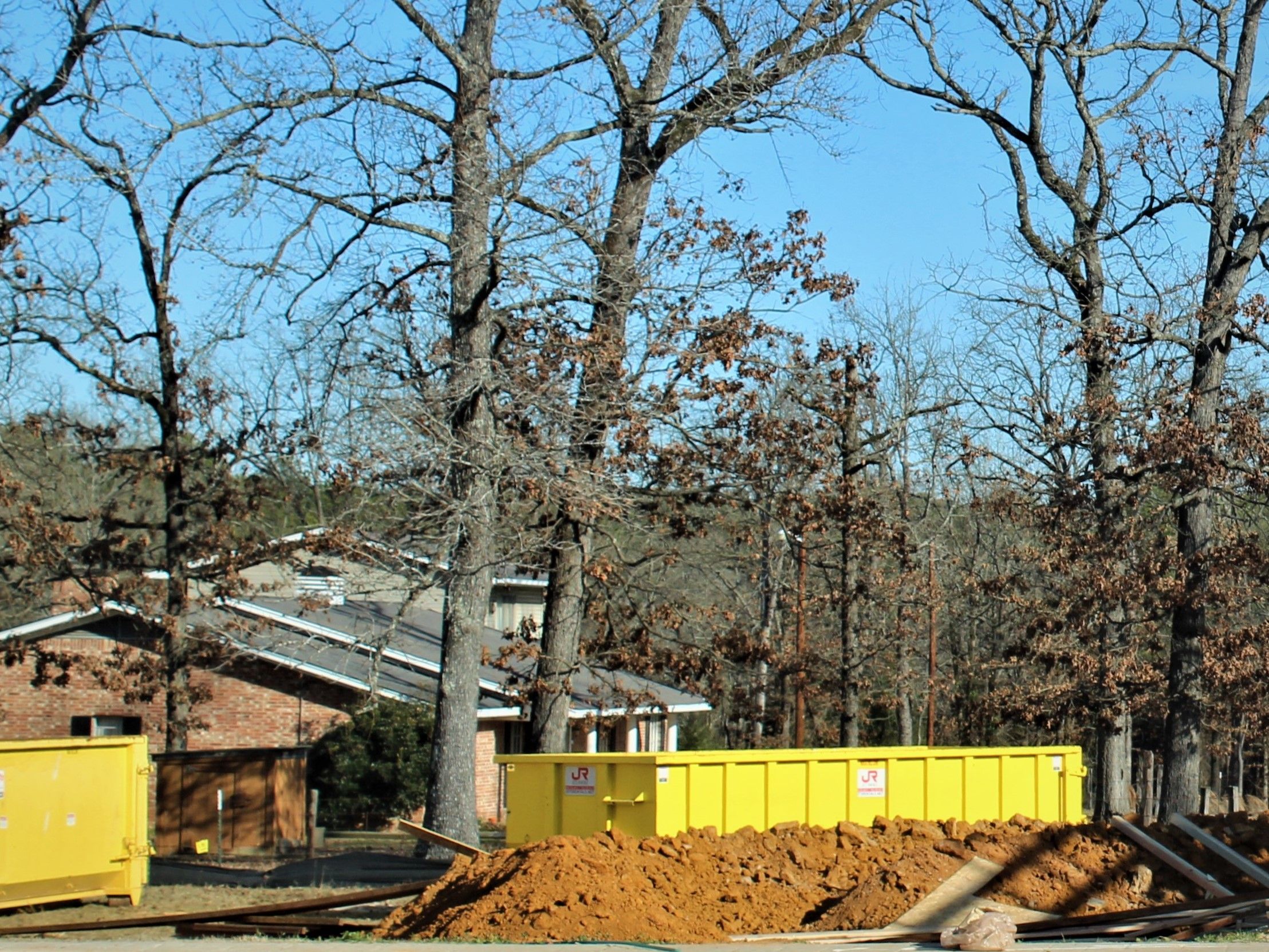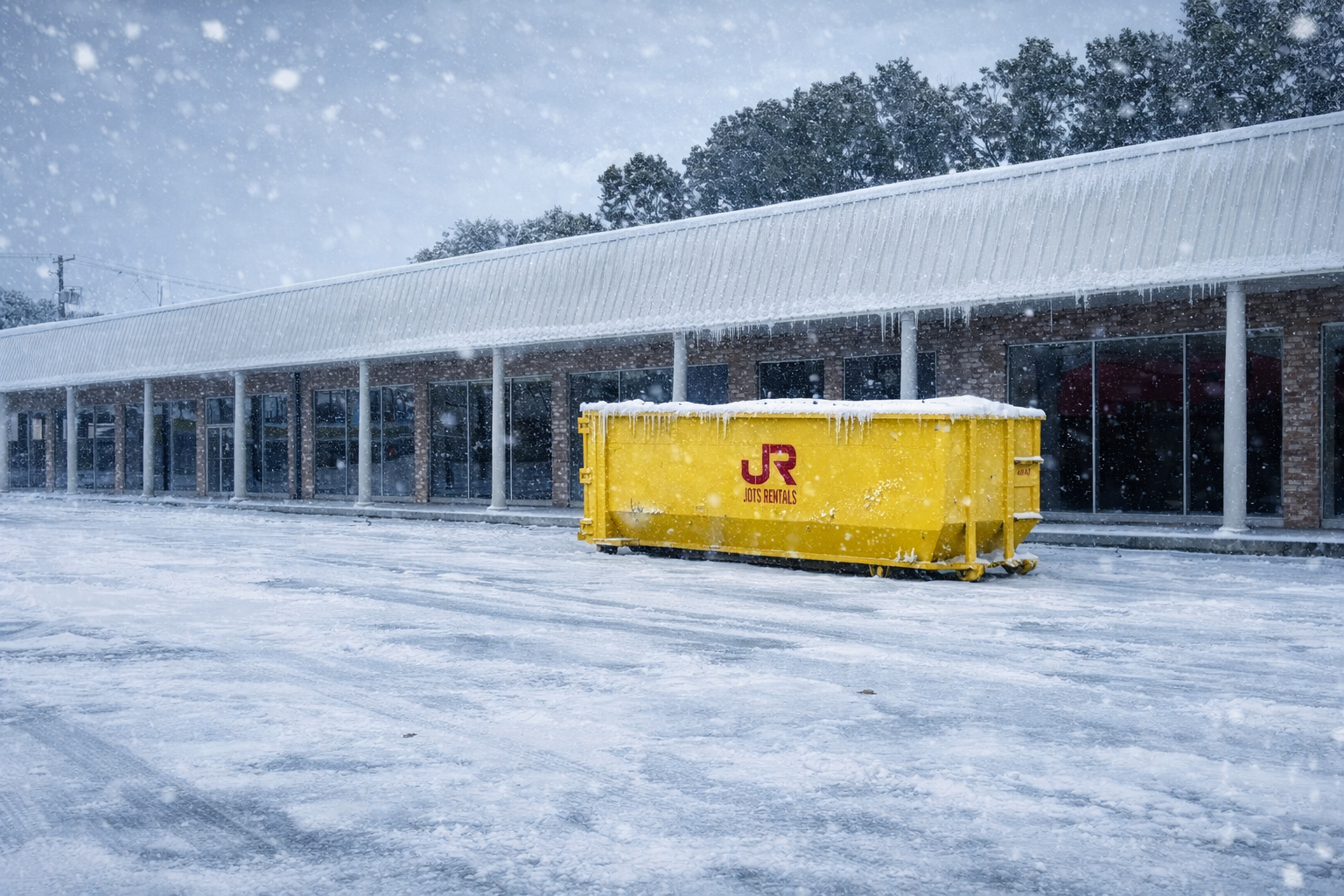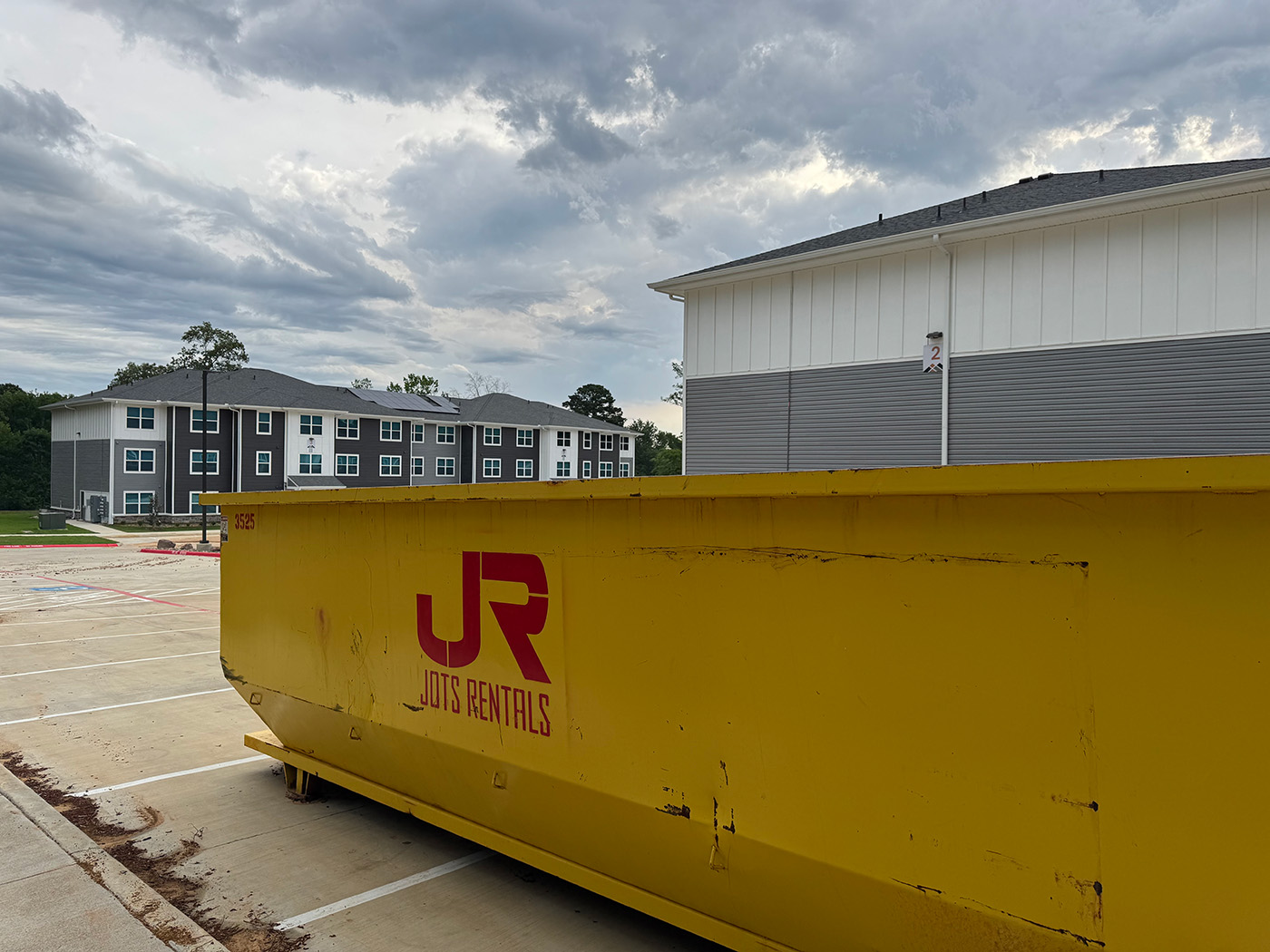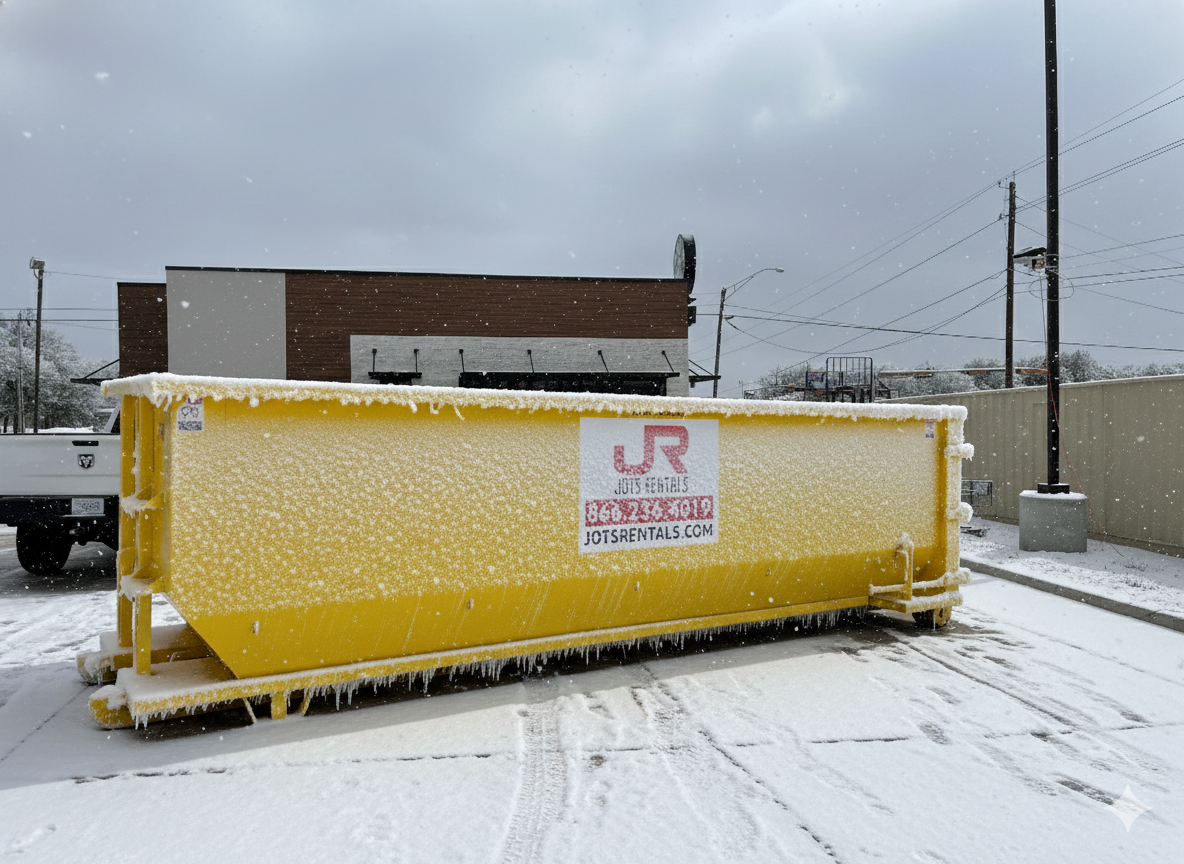Did you know over 70% of construction and renovation projects hit snags because of not having enough space for waste? That’s why picking the right dumpster is a game-changer.
This guide is packed with essential tips for renting a roll-off dumpster. We’ll walk you through picking the perfect size, what you can and can’t toss in, understanding permit rules, and how to keep costs down while staying safe. You’ll learn how to eyeball your debris volume and weight, navigate the rental steps like a pro, and tap into Jots Rentals’ local know-how in Northeast Texas and Northwest Louisiana for a smooth waste management experience. By following these pointers, construction pros, event organizers, and homeowners can dodge delays, keep a lid on expenses, and do their part for sustainable disposal.
How Do You Nail Down the Right Roll-Off Dumpster Size for Your Job?
Choosing the right roll-off dumpster size is all about matching your debris volume and weight to the container’s capacity. Get this right, and you’ll avoid overfilling and those nasty surprise fees. Picking the perfect size means loading is a breeze and your dumpster gets picked up on time, saving you precious time and money. For example, if you’re a homeowner tackling a small kitchen remodel, a 10-yard dumpster is usually just the ticket for hauling away cabinets and old flooring.
Here’s your quick guide to sizing up your dumpster, with more details coming your way in the next sections.
What Are the Standard Roll-Off Dumpster Sizes and What Are They Good For?
Roll-off dumpsters typically come in four handy sizes—10, 20, 30, and 40 cubic yards—each designed for different project scales and types of debris.
Size | What It Holds | Perfect For |
10-Yard | About 3 pickup truck loads | Small cleanouts, clearing out the garage |
20-Yard | About 6 pickup truck loads | Home renovations, medium-sized projects |
30-Yard | About 9 pickup truck loads | Commercial remodels, roofing jobs |
40-Yard | About 12 pickup truck loads | Big construction sites, demolition projects |
For most residential remodels, a 20-yard dumpster hits that sweet spot between capacity and cost, which leads us right into how to estimate your debris volume and weight.
How Do You Figure Out the Volume and Weight of Your Debris for Sizing?
Estimating your debris volume and weight is pretty straightforward: measure your pile, convert it to cubic yards, and then get a rough idea of the material’s density.
- Measure the length, width, and height of your debris pile in feet.
- Multiply these numbers together and then divide by 27 to get your cubic yards.
- Check out density charts—like for wood (300–600 lb/yd³) or concrete (2,500 lb/yd³)—to estimate the total weight.
Getting these estimates right means you won’t go over weight limits and get hit with extra fees. This is key to picking the best dumpster size for your specific project.
Which Dumpster Size Is the Best Fit for Home vs. Business Projects?
Residential and commercial projects usually need different dumpster sizes because of the volume and complexity of the debris. This table breaks down the recommended sizes for each:
Project Type | Recommended Size | Why It Works |
Residential Remodel | 10–20 yards | Handles moderate waste from flooring, cabinets, and walls |
Commercial Renovation | 30 yards | For larger debris volumes from structural changes |
Event Cleanup | 20 yards | Good for mixed trash, decor removal, and light landscaping debris |
New Construction | 40 yards | Handles high-volume debris from framing and demolition |
Matching the dumpster size to your project type makes things way more efficient and helps you control costs. Now, let’s talk about what you can actually put in the dumpster.
What Can and Can’t Go in a Roll-Off Dumpster?
Knowing what’s okay to toss and what’s off-limits is crucial for staying compliant, safe, and environmentally friendly. Sorting your waste properly cuts down on contamination risks and avoids hefty fines. For instance, keeping household junk separate from yard waste means you won’t run into unexpected handling issues.
The next few sections will lay out exactly what you can throw in, what’s strictly forbidden, and why those restricted items are a no-go.
What Kinds of Materials Can I Put in a Roll-Off Dumpster?
You can generally toss common construction debris and household waste that doesn’t pose a significant environmental risk:
- Construction scraps like lumber, drywall, and old roofing shingles.
- Yard waste including branches, leaves, and grass clippings.
- Household clutter like old furniture, carpeting, and non-hazardous appliances.
- Scrap metal from wiring, plumbing fixtures, and appliances.
Sorting your acceptable materials makes recycling and disposal much smoother. This brings us to the items you absolutely cannot include and why.
What Are the Most Common Forbidden Items and Why Are They Banned?
Certain items are a hazard or require special disposal methods, so they can’t go into standard dumpsters:
- Hazardous waste like solvents, pesticides, and pool chemicals.
- Electronics and batteries because they contain toxic components.
- Tires, which can trap gases and take forever to break down.
- Paint and flammable liquids that could easily ignite.
- Materials containing asbestos, which need certified handling.
How Do Forbidden Items Mess with Safety and Environmental Compliance?
Forbidden items bring toxicity, flammability, and legal risks that standard disposal methods just can’t handle. Each regulated material needs special attention to prevent contaminating soil or water and to meet environmental laws. For example, asbestos has to be removed by licensed professionals before it can go anywhere near a landfill. Making sure these prohibited items stay out of your dumpster keeps your project safe and compliant with regulations, which naturally leads us to how the rental process works.
How Does the Roll-Off Dumpster Rental Process Actually Work?
Renting a roll-off dumpster involves four straightforward steps: ordering, delivery, loading, and pickup. Getting these right makes managing your debris a breeze. Each step needs to be coordinated to keep your project on schedule and within budget. For instance, scheduling your dumpster delivery for the first day of demolition means you won’t have an empty container sitting around costing you money.
The following sections will break down each crucial phase in detail.
What Are the Exact Steps to Rent a Dumpster?
Renting a dumpster is a simple process that ensures it arrives and gets picked up right on time:
- Figure out your project’s scope and pick the right dumpster size.
- Place your order with a local provider, telling them your desired delivery date and where you need it placed.
- Receive the dumpster and position it on a suitable spot.
- Load your debris, making sure to stick to weight limits and sorting rules.
- Schedule your pickup for when you’re done or when your rental period ends.
Following these steps guarantees you’ll get efficient service, and it also highlights how important it is to get your site ready.
How Do You Get Your Site Ready for Dumpster Delivery and Placement?
Getting your delivery site ready means finding a flat, stable spot and clearing away anything that might get in the way of the truck.
- Use cones or spray paint to mark the drop-off zone so the driver knows exactly where to put it.
- Clear away any low-hanging branches or move vehicles to give the truck plenty of room.
- Lay down plywood or boards under the dumpster to protect your driveway or lawn.
Making sure the truck has clear access and protecting your property helps everything run smoothly and ties into scheduling your pickup.
When and How Do You Schedule Your Dumpster Pickup?
You can schedule your dumpster pickup once you’re finished loading or when your rental period is up. Giving your provider a heads-up 24–48 hours in advance ensures they can grab it when you need them to. When pickup happens often depends on whether you’ve stayed within the weight limits and if the area around the dumpster is clear. For example, if you have a 7-day rental, it often wraps up on a Friday, and you’ll want to schedule pickup before the weekend work stops. Scheduling pickup promptly helps you avoid extra fees and wraps up the rental process without a hitch.
What Are the Usual Costs and Fees for Renting a Roll-Off Dumpster?
The cost of renting a roll-off dumpster includes delivery, pickup, disposal fees, and how long you keep it – all these factors add up to your total bill. Knowing the pricing upfront helps you budget accurately and avoid any nasty surprises. For instance, renting a 20-yard dumpster in northeast Texas typically runs between $350 and $550.
The next sections will dive into what affects the cost, weight limits, and how to steer clear of extra fees.
What Factors Go Into Determining Dumpster Rental Prices?
A few key things combine to set your rental price:
- The size and capacity of the dumpster you choose.
- The total weight of your debris compared to the allowed limits.
- How long you need the dumpster and if you extend the rental.
- The distance for delivery and pickup.
- Disposal fees, which can change based on the type of waste.
Understanding these factors helps you manage your budget better and avoid those hidden charges.
How Do Weight Limits and Overage Fees Affect Your Rental Cost?
Every dumpster has a maximum weight limit, usually between one and five tons. If you go over this, you’ll face overage fees. Exceeding the weight limit means extra charges per ton, which can really drive up your bill. For example, going over by just one ton might cost you an extra $75, so carefully estimating your debris weight is crucial for protecting your budget.
Accurate volume calculations lead directly into practices that help you avoid unexpected charges altogether.
How Can You Dodge Hidden Fees and Unexpected Charges?
Avoiding surprise fees starts with clear communication and getting things in writing:
- Make sure you confirm the weight limits and overage rates in writing.
- Ask if an all-inclusive flat-rate option is available.
- Carefully read your rental agreement for any environmental or administrative fees.
- Take photos of the site conditions before delivery to guard against damage claims.
Being proactive with these checks helps you control costs and sets you up to understand permit requirements.
Do You Need a Permit to Place a Dumpster?
Whether you need a permit for your dumpster depends on where you plan to put it—on public or private property—and your local regulations. Permits help you avoid fines and keep public spaces clear. For example, putting a dumpster on a city street almost always requires official approval.
When Is a Dumpster Permit Necessary for Public vs. Private Property?
You’ll need a permit if your dumpster will be on public property, like streets, sidewalks, or alleys. Placing a dumpster on private property, such as your driveway or a fenced yard, usually doesn’t require a permit. Getting the right authorization means you won’t get ticketed and you’ll be following community rules.
How Do You Get Dumpster Permits in Northeast Texas and Northwest Louisiana?
Getting a permit in these areas follows a similar process:
- Find your local city or county permitting office.
- Fill out an application form with details about where you’ll place the dumpster and for how long.
- Pay the required fee, which can differ depending on the area.
- Wait for your permit to be approved (digitally or on paper) before scheduling delivery.
Getting your permit on time means your project won’t face delays, and it also helps you consider any HOA rules.
What HOA and Private Property Rules Might Affect Dumpster Rentals?
Homeowners associations might have rules about how visible your dumpster can be, how long it can stay, or if it needs to be screened. It’s often a good idea to check your HOA’s covenants and let your neighbors know before you place the dumpster. Following these private rules helps keep the peace in your community and ensures your project stays compliant.
How Can You Make the Most of Your Roll-Off Dumpster Rental?
Getting the most out of your dumpster rental comes down to loading efficiently, following safety rules strictly, and disposing of waste responsibly. Doing things right can shorten your project timelines and boost your environmental efforts. For example, separating recyclables beforehand means less goes to the landfill.
The following sections offer practical best practices you can use.
What Are the Best Ways to Load Your Dumpster Efficiently?
Smart loading techniques help you use the dumpster’s capacity to the fullest and reduce the number of trips needed:
- Put heavy, dense items like concrete and brick at the bottom.
- Break down large furniture and appliances to make them fit better.
- Distribute the weight evenly from front to back and side to side.
- Fill in any gaps with smaller debris to maximize your cubic yard usage.
Loading strategically speeds up debris removal and leads us into safety considerations.
What Safety Tips Should You Follow When Using a Dumpster?
Sticking to safety guidelines helps prevent injuries and damage to equipment:
- Always wear gloves, eye protection, and steel-toed boots.
- Don’t stand on the edges of the dumpster or reach too far into the container.
- Use proper lifting techniques—bend your knees and keep heavy items close to your body.
- Keep children and anyone not involved away from the loading area.
Safe practices contribute to a smooth rental experience and connect to responsible disposal efforts.
How Does Jots Rentals Help with Environmentally Friendly Waste Disposal?
Jots Rentals is all about promoting recycling and diverting waste from landfills. We sort materials like concrete, metal, and wood to be processed at certified facilities. Every dumpster rental comes with guidance on separating recyclables to lessen your project’s environmental impact. These sustainable practices help you meet regulations and show you care about your community.
Where Can You Find Expert Help and Support for Roll-Off Dumpster Rentals?
Getting expert help makes every part of the rental process easier, from getting a quote to the final disposal, and boosts your project’s efficiency. Professional advice ensures you get the right container and follow all local rules. The sections below explain how to connect with Jots Rentals for support and services.
How Can You Contact Jots Rentals for a Custom Dumpster Rental Quote?
You can get a personalized dumpster rental quote by giving Jots Rentals’ rental specialists a call or by filling out our quick service request form. Just provide details about your project—like the size you need, the type of debris, and how long you’ll need it—and we’ll give you accurate pricing and delivery estimates. Our responsive support helps speed up your planning and prevents last-minute scrambles.
What Other Waste Management Services Does Jots Rentals Offer?
Jots Rentals offers a full suite of site services to go along with your dumpster rentals:
- Portable restrooms for events and job sites.
- Hand wash stations to keep hygiene standards high.
- Holding tanks for managing sanitary waste.
Our complete solutions make us your one-stop shop for temporary site needs.
Why Should You Choose Jots Rentals as Your Local Dumpster Rental Partner?
Jots Rentals combines local knowledge with a focus on customer service to deliver prompt dumpster placement and removal. We know the ins and outs of Northeast Texas and Northwest Louisiana regulations, ensuring you’re compliant with permits. Plus, our customer-first approach means we tailor solutions for projects of any size. With reliable service and a commitment to sustainable disposal, Jots Rentals is the trusted partner you need for your waste management challenges.
Renting a roll-off dumpster doesn’t have to be complicated or break the bank. By estimating your debris, picking the right size, sorting your materials, getting any necessary permits, and following safety best practices, you can simplify disposal and avoid unexpected issues. Let Jots Rentals’ regional expertise and full range of rental services support your project from start to finish. With these roll-off dumpster rental tips, you can confidently manage waste, control your budget, and maintain environmental responsibility on every job.




